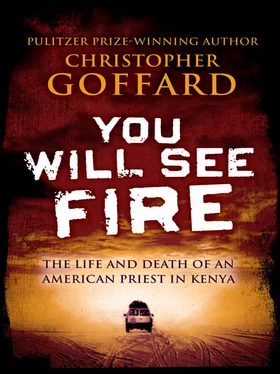1 ...7 8 9 11 12 13 ...28 One Christmas at his one-room country school, Kaiser drew a nativity scene on the school chalkboard, carefully detailing the three kings, lovingly texturing the wool of the sheep, scrupulously shaping the halo around baby Jesus’ crib. Nights at home, he sat with the family around the kerosene lamp, creating images that might have sprung from the covers of a boys’ pulp magazine: horses, sheriffs, gunslingers, elaborate battle scenes. In one image of men at war, he lavished detail on the soldiers’ uniforms, on the sights of their M1 rifles, on their anguished faces as bullets riddled their bodies.
His capacity for concentration was married to an impetuous streak. One winter morning as a high school freshman, he and his elder brother, Francis, were exploring the deep woods with their rifles in search of mallards. Coming upon an ice-sheathed pond, the boys approached on elbows and knees, waiting silently for ducks to cluster in the pond’s melted center. They fired; the birds shuddered and lay floating. John Kaiser plunged into icy water above his waist to retrieve their prize. He emerged trembling uncontrollably and unable to speak. He ran home, a good mile’s distance, to be wrapped in a quilt and warmed by the potbellied cast-iron stove.
Rheumatic fever came on quickly, confining him to his bed for months, the vibrant sandy-haired boy shrunk to the bones. From his bed, he tracked animals with his rifle through the open window. The seasons changed around him, sending their messages: howling blizzards, snowmelt trickling from the eaves, the scratching of june bugs against the screens.
He would never forget his body’s capacity to betray him. During the slow recovery and afterward, he hardened it against another possible mutiny, steeling it with endless sit-ups and barbell curls, pushing it beyond endurance.
For years, people noticed his hand fluttering up to his heart involuntarily; in photographs of the period, people remarked that he stood like Napoléon. The habit lasted through his years at St. John’s Preparatory School, where he grew tall and fast and strong, catching footballs one-handed and setting a class record in pole vaulting, and through his two years at St. Louis University, where he competed formidably on the wrestling team. It survived well into his army career.
Kaiser had enlisted, following the example of his brother Francis, who had fought in Korea. What survives in official army archives is scant. He served from April 29, 1954 Конец ознакомительного фрагмента. Текст предоставлен ООО «ЛитРес». Прочитайте эту книгу целиком, купив полную легальную версию на ЛитРес. Безопасно оплатить книгу можно банковской картой Visa, MasterCard, Maestro, со счета мобильного телефона, с платежного терминала, в салоне МТС или Связной, через PayPal, WebMoney, Яндекс.Деньги, QIWI Кошелек, бонусными картами или другим удобным Вам способом.
to April 26, 1957, and was discharged as a corporal at Fort Bragg, North Carolina. He was part of the Eighty-second, also known as the “All-Americans,” a celebrated elite airborne division that fought in some of World War II’s decisive battles, including the Battle of the Bulge, and participated in the invasion of Normandy.
Kaiser joined during one of the hotter periods of the Cold War—the armistice that brought a cease-fire to the Korean conflict was just nine months old, and an uneasy peace prevailed. The Eighty-second had been kept in strategic reserve from the conflict, poised to repel Soviet invasions elsewhere. Ready to fly, ready to jump: That was the unit’s raison d’être, its outsized pride, the justification for a training crucible that made the men swagger even in the company of marines. “We were much more disciplined than the Marine Corps because of our unique position,” recalled William Meek, the son of a Kentucky coal miner, who roomed with Kaiser at Fort Bragg and trained with him in Company D, a heavy-mortar platoon in the Eighty-second. “We were to be prepared within a few hours’ notice to go anywhere in the world where there was a trouble spot. We were to stay in top physical shape. Even the mess steward, if we were overweight, would determine how big a portion of potatoes we could have.” He would recall Kaiser as a loner who rarely left the base on off days, venturing instead to the library, the swimming pool, or the woods.
As a paratrooper and a noncommissioned officer, Kaiser earned $50 a month on top of his $120 wages, and he sent as much home to his family as he could. At the firing range, Kaiser proved an expert shot. He learned to take apart his M1 rifle and reassemble it blindfolded, to disable an enemy with a thrust of the butt plate to the jaw, and to kill with a lunge of the bayonet. To strengthen their legs for parachute jumps, the soldiers endured endless marching and running, the men in formation counting cadence in eight-mile jogs around the base, sounding off, and in the blazing summer heat stripping to the waist, so they ran only in boots and khakis, the sweat from one man’s swinging arm splattering the bare back of the man ahead, and that man’s sweat hitting the man ahead of him, all the way through the ranks in the unremitting North Carolina sun. Over and over, they practiced the paratroop roll, learning to let their weight hit the ground in degrees, bodies folding up accordionlike to lessen the shock of impact. Suited up, latched into the restraining rig, they left the tarmac in C-119 Flying Boxcars and sat in two facing rows, twenty men on each side, climbing above cotton and peanut country dotted down below with the tiny shapes of farmers and mules. Look straight out, not down. A layer of planes leveled out at eighteen hundred feet, another at three thousand. Then came the interminable moment: standing at the open bay door, waiting for the green light to trigger the plunge. Then the air filled with falling soldiers, two thousand at once, “like Cheerios in a bowl of milk,” Meek recalled, jostling one another as parachutes opened.
By now Kaiser could lift more than his two-hundred-pound weight over his head. His hand still crept to his heart, a decade after his fever, as if to suggest why he seemed to spend every free minute conditioning his body with push-ups and sit-ups and barbell curls, an exercise regimen so intense that Meek thought it bordered on the neurotic. Once they were swimming in Chesapeake Bay, Kaiser and Meek and another soldier, diving, having a hell of a time, and found themselves about a mile offshore in the shipping lanes. They had brought an army air mattress in case someone cramped up, and an exhausted Meek wanted to ride it back to shore. Kaiser would not surrender it, announcing, “You’re just now building muscle.” When Meek insisted, Kaiser answered by letting the air out of the mattress. Meek cursed and started swimming, and succeeded in making it back under his own steam. How had Kaiser calibrated the risk? Perhaps he believed he’d be able to rescue his friend with little trouble should he flounder; nobody doubted that he would have risked his own life to do so. Still, Meek thought that the Minnesota soldier’s behavior was foolish, stubborn.
By all accounts, Kaiser relished the physical life of a soldier and considered it, for a time, a vocation. It’s possible that military existence, with its elaborate codes and structures, rituals and hierarchies, supplied a kind of peace to a man whose energies sometimes threatened to over-top their banks; an impetuous temperament can find psychic freedom in order, routine, and clear lines of authority. Still, he seemed to like skirting rules. He kept a .22-caliber pistol buried in a plastic bag at the base, Meek recalled, though he couldn’t say what Kaiser intended it for. And Kaiser once staged the clandestine nighttime excavation of a buried crate of surplus ammo—he could not abide the waste of good bullets—and then smuggled it out of the base in his car trunk, with his mother smiling obliviously from the passenger seat.
Читать дальше












